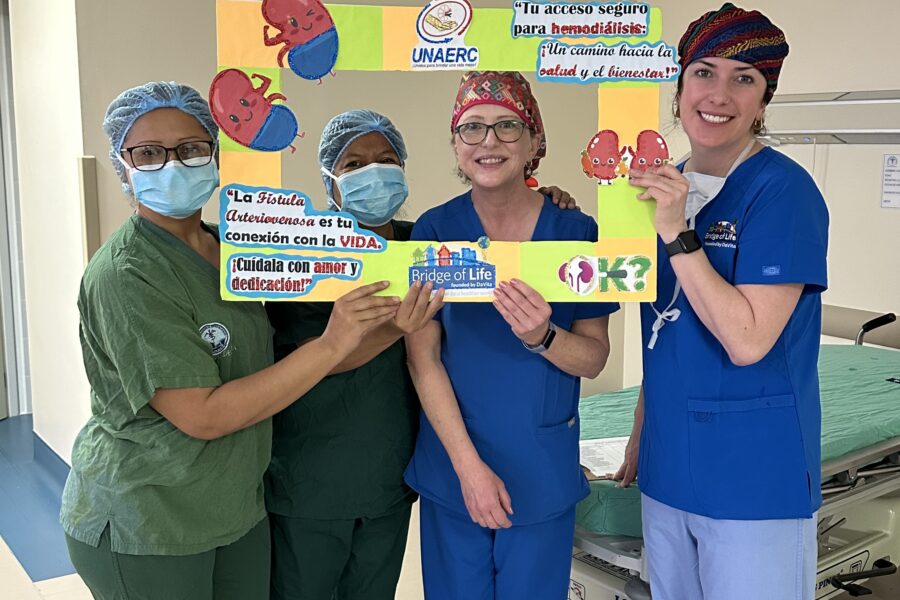In early March, Sarah McMillin, CRNA, a nurse anesthetist with the UNMC Department of Anesthesiology, joined a team of medical professionals in Villa Nueva, Guatemala, as part of a humanitarian mission led by Bridge of Life, an organization under the umbrella of DaVita Dialysis.
McMillin said their primary goal was to provide life-changing surgeries and essential training to local health care providers in an effort to expand dialysis access in a country facing an overwhelming kidney failure crisis.
“Guatemala has a disproportionately high rate of kidney failure, with many patients requiring dialysis at a young age,” McMillin said. “We encountered many patients in their 30s, some of whom had been battling kidney disease for a decade. Many arrived with dangerously high blood pressure levels, often exceeding 250/120. Without access to sustainable treatment options, these patients rely on temporary catheter placements, leading to complications and frequent replacements.”
The Bridge of Life initiative aims to create long-term solutions by developing a permanent dialysis center and equipping local surgeons and anesthetists with the necessary skills to provide specialized care, McMillin said.
The volunteer team included three surgeons and two anesthesia providers. McMillin said that although the primary focus was clinical care, the mission also prioritized training local medical professionals.
A major shift in this year’s approach was the emphasis on nerve blocks for anesthesia, a technique that allows for better pain control and improved surgical conditions, McMillin said.
“This was challenging with only two anesthesia providers available, and one unfamiliar with performing nerve blocks; the responsibility largely fell on me. Despite these challenges, we successfully completed 12 to 14 procedures per day.”
Language barriers, differences in medical education and a lack of available resources provided other challenges. “Nurses there function more like techs or certified nursing assistants rather than registered nurses, and anesthesiologists often lack exposure to advanced techniques due to limited training programs,” McMillin said.
In the future, McMillin said, she would recommend refining the training approach by working intensively with one or two local surgeons, ensuring knowledge transfer is more effective. “The hope is that, over time, Guatemalan health care providers will gain the confidence and skills necessary to perform these procedures independently,” she said.
The lack of medical supplies hurt, McMillin said.
“The hospital had only a limited selection of anesthetic drugs, relying heavily on fentanyl and ketamine. Intravenous fluids were scarce and reserved for trauma cases, making even the simplest procedures more challenging.”
Medications like decadron, commonly used to prolong nerve block effectiveness and reduce postoperative nausea, were unavailable, she said.
Despite these limitations, the mission team adapted, using the resources at hand to provide the best possible care, McMillin said. By bringing their own supplies and sharing practical techniques, they maximized the impact of their efforts.
As Bridge of Life continues its work in Guatemala, the team remains committed to refining the approach and expanding the reach. Future missions will focus not only on direct patient care but also on enhancing local providers’ ability to deliver quality dialysis treatments independently, McMillin said.
For McMillin, the experience was both physically exhausting and profoundly rewarding. “It underscored the importance of medical missions in bridging health care gaps worldwide – I would absolutely do it again,” she said. “Each mission brings new lessons, new challenges and most importantly, new hope for patients and their families.”
“It’s good for the soul and the soul of the department.”
